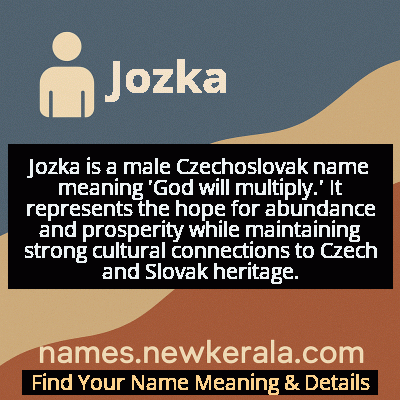Jozka Name Meaning & Details
Origin, Popularity, Numerology Analysis & Name Meaning of Jozka
Discover the origin, meaning, and cultural significance of the name JOZKA. Delve into its historical roots and explore the lasting impact it has had on communities and traditions.
Name
Jozka
Gender
Male
Origin
Czechoslovakian
Lucky Number
9
Meaning of the Name - Jozka
Jozka is a male Czechoslovak name meaning 'God will multiply.' It represents the hope for abundance and prosperity while maintaining strong cultural connections to Czech and Slovak heritage.
Jozka - Complete Numerology Analysis
Your Numerology Number
Based on Pythagorean Numerology System
Ruling Planet
Mars
Positive Nature
Generous, passionate, energetic, and humanitarian.
Negative Traits
Impulsive, impatient, moody, and can be overly emotional.
Lucky Colours
Red, maroon, scarlet.
Lucky Days
Tuesday.
Lucky Stones
Red coral, garnet.
Harmony Numbers
1, 2, 3, 6.
Best Suited Professions
Military, sports, philanthropy, leadership roles.
What People Like About You
Courage, energy, leadership, generosity.
Famous People Named Jozka
Jozka Jabůrková
Journalist and Politician
First female editor-in-chief in Czechoslovakia, women's rights activist
Jozka Pejskar
Radio Journalist and Writer
Voice of Radio Free Europe, documented Czechoslovak exile communities
Jozka Černý
Folk Musician and Singer
Legendary Moravian folk singer who preserved traditional music
Jozka Holas
Sports Coach
Renowned Czechoslovak ice hockey coach of championship teams
Name Variations & International Equivalents
Click on blue names to explore their detailed meanings. Gray names with will be available soon.
Cultural & Historical Significance
The name's evolution reflects broader social changes in Czechoslovakia. During the interwar First Republic, Jozka symbolized the optimistic, forward-looking spirit of the new democratic state while maintaining connection to traditional values. In the communist era, the name sometimes carried subtle connotations of cultural resistance, as traditional names were favored by those seeking to maintain national identity against Soviet influence. Today, Jozka represents a conscious choice to honor heritage while embracing modernity, serving as a living link to cultural traditions that have survived centuries of political and social transformation.
Extended Personality Analysis
People named Jozka are typically characterized by their grounded nature and strong connection to community values. They tend to be practical problem-solvers who approach life with a blend of traditional wisdom and adaptive flexibility. Their personality often reflects the name's origins as a familial diminutive - they're approachable, good-humored, and excel in creating warm, trusting relationships. Jozkas typically possess a quiet confidence that doesn't need external validation, making them reliable in crises and steady influences in their social circles.
These individuals often demonstrate a particular talent for preserving and transmitting cultural knowledge, whether through storytelling, craftsmanship, or community leadership. They tend to be observant and thoughtful, with an ability to understand complex social dynamics while maintaining their ethical compass. While they respect tradition, they're not rigidly conservative - most Jozkas show remarkable adaptability when circumstances change, balancing respect for the past with practical engagement with the present. Their strength lies in their authenticity and the consistency between their values and actions, making them natural community builders who strengthen social bonds wherever they go.
Modern Usage & Popularity
In contemporary naming practices, Jozka has transitioned from being primarily a diminutive to becoming established as a formal given name in its own right. While it remains most popular in the Czech Republic, it has gained recognition internationally among diaspora communities seeking to maintain cultural connections. The name's usage patterns show an interesting demographic split - it's chosen both by traditional families in rural areas and by urban professionals making conscious cultural statements. Modern Jozkas often benefit from the name's distinctive quality in international contexts while maintaining its warm, approachable feel. The name has seen a steady increase in registration since the 1990s, though it remains outside the top 100 names in most regions. Its contemporary appeal lies in its perfect balance of cultural specificity and universal accessibility, making it both meaningful and practical in our globalized world.
Symbolic & Spiritual Meanings
Symbolically, Jozka represents the profound meaning contained within simplicity and the extraordinary nature of ordinary life. The name embodies the concept of cultural continuity - how traditions, values, and identities are multiplied and preserved across generations through the seemingly simple act of naming. It symbolizes the idea that true abundance comes not from material wealth but from rich relationships, cultural heritage, and meaningful connections to community and place. The biblical meaning 'God will multiply' transforms into a metaphor for how individual lives can multiply goodness, knowledge, and cultural wealth within their communities.
Metaphorically, Jozka serves as a reminder that the most enduring forms of power often reside in humility, authenticity, and connection to roots. The name represents the quiet resilience of cultural identity that survives political changes, social transformations, and historical challenges. It symbolizes how diminutive forms can carry immense cultural weight, demonstrating that significance isn't dependent on grandeur but on depth of meaning and connection to shared human experience across time and place.

